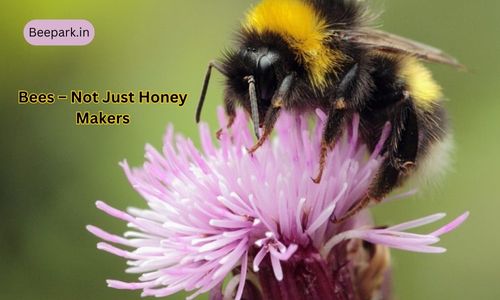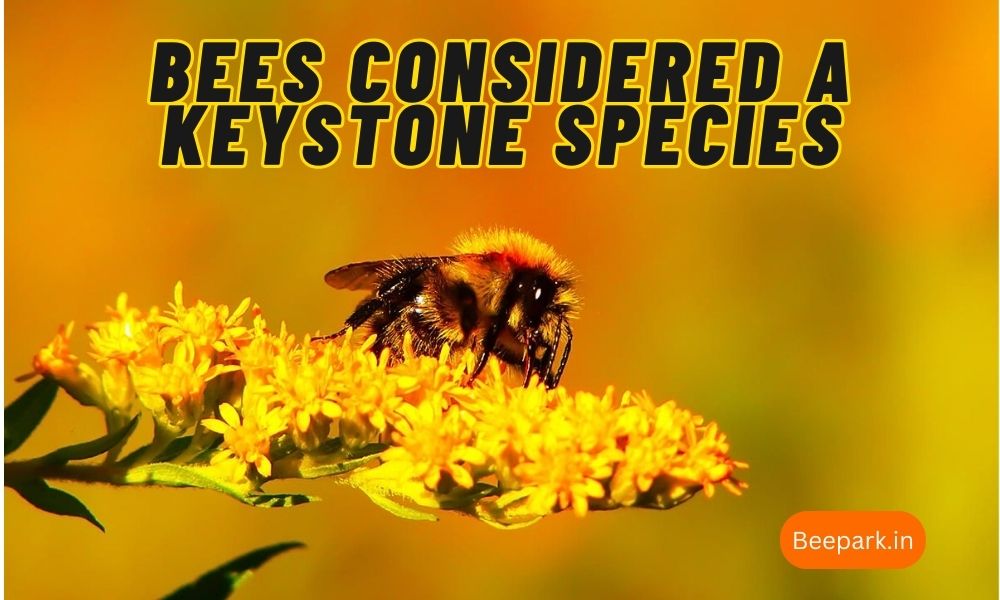Have you ever paused to understand the small however powerful creatures that play a pivotal function in our ecosystem? Yes, I’m speaking approximately bees – those fuzzy, flying insects that now and again scare us with their stings however have a heart of gold with regard to their environmental contributions. Bees aren’t simply humming bugs; they’re the unsung heroes of our natural world. In this article, we’ll explore why are bees considered keystone species, and we promise to keep it simple, entertaining, and bee-yond fascinating!
What’s a Keystone Species, Anyway?

Before we dive into the world of bees, allow’s apprehend what a keystone species is. Imagine a stone arch bridge; the keystone is the principal stone that holds the whole shape collectively. Similarly, in ecology, a keystone species is one which has a disproportionately giant effect on its environment.
Their presence, although regularly small in numbers, is vital in retaining the stability and diversity of the complete ecosystem. Without keystone species, the ecosystem could crumble like a sport of Jenga long gone wrong!
Bees – Not Just Honey Makers
When we think of bees, the primary issue that probably involves thoughts is honey. Sure, they may be sweet honey-makers, however, there’s a lot greater to them than meets the attention.
Bees are important pollinators, and they’re hardworking and dedicated to their job like a busy bee! While humming from flower to flower, they switch pollen, enabling flowers to produce culmination and seeds. It’s like they may be nature’s very very own Cupids, making sure plant populations maintain developing and thriving.
The Dance of the Honeybees
Ever questioned how bees speak? Well, it’s like they have got their own secret language! When honeybees discover a wealthy supply of nectar, they perform a unique dance called the waggle dance to tell their hive friends about the vicinity. Imagine a bee performing some waggle, like a bee boogie, to reveal the path and distance to the opposite bees.
It’s like they have an integrated GPS! This dance facilitates the entire colony to work together like a properly-choreographed dance troupe to accumulate nectar and pollen successfully.
Busy Bees: Guardians of Biodiversity
Bees are not choosy eaters; they go to numerous sorts of plants to fulfill their hunger for nectar. As they hop from one plant species to any other, they inadvertently sell biodiversity by using cross-pollinating exclusive flowers.
This diversity guarantees that the environment remains strong, resilient, and full of surprises! It’s like bees are the closing meals critics, ensuring we have a numerous menu of plant life to revel in.
Bee-tactic Food Chain Connections
Now, let’s talk about food chains. Remember those diagrams in technology elegance that showed how animals devour different animals in a never-ending cycle? Bees are like the mystery factor in this recipe for existence.
They’re often the primary link in the meals chain, as many animals rely directly or in a roundabout way on the flora that bees pollinate for or their food. Think of bees because of the farmers who grow the meals for all the other critters! Without bees, the food chain ought to move haywire, and we would be left with a bee catastrophe on our hands!
Bee-a-beautiful Ecosystem Services
Bees offer various ecosystem offerings that make our lives less difficult and greater exciting. They make contributions to agriculture by means of pollinating crops like apples, strawberries, and almonds.
Can you consider a global without these tasty treats? I shudder at the idea! Bees additionally offer important offerings to wild ecosystems, making sure that forests, meadows, and other herbal habitats continue to be vibrant and thriving. So, subsequent time you enjoy a scrumptious piece of fruit or take a stroll through a beautiful park, consider to thank the bees for their hard work!
Bees Facing Bee-emergency
Now, it is time for a more severe note. Bees are facing a bee emergency because of numerous threats that jeopardize their lifestyles. Climate exchange, habitat loss, pesticide use, and illnesses are taking a toll on bee populations worldwide.
As responsible earthlings, it is our duty to shield and maintain these tiny heroes and their habitats. Simple movements like planting bee-friendly vegetation in our gardens, assisting organic farming practices, and elevating cognizance approximately their significance can cross a protracted way in bee conservation.
Bee Happy: How to Support Bees
Okay, sufficient with the gloomy stuff! Let’s focus on the high-quality aspect of things. There are plenty of approaches we will aid our humming buddies and become bee-better stewards of the surroundings.
- Plant Bee-friendly Flowers: Create a buzzing buffet on your lawn with the aid of planting flowers like lavender, sunflowers, and wildflowers. Bees can be for all time thankful, and you may have a colorful and lively garden to revel in.
- Avoid Pesticides: Opt for natural pest control strategies and avoid using harmful insecticides which could damage bees and different useful bugs.
- Bee-come Educated: Learn extra about bees and unfold the word. The greater we recognize, the better geared up we are to shield these notable creatures.
- Support Local Beekeepers: If you revel in honey, purchase it from nearby beekeepers who exercise sustainable and bee-pleasant beekeeping methods.
- Create Bee Hotels: Provide shelter for solitary bees by way of creating a bee hotel or buying one. It’s like a holiday home for bees!
To Bee or Not to Bee? That is the Question!
In the end, bees aren’t simply fuzzy, stinging bugs; they’re the be-all and give-up-all in relation to their position as keystone species. From pollinating our favorite foods to keeping biodiversity and supporting entire ecosystems, bees are proper heroes without capes.
But they want our help, and it’s excessive time we start being extra aware of our actions and turn out to be better stewards of the environment. So, permit’s boost our imaginary glasses full of honey and toast to the incredible world of bees – the buzzing heroes that make our international a sweeter region to stay!
Remember, bee type, bee accountable, and bee a bee-lover! Let’s work together to create a buzz-worthy destiny in which bees thrive, vegetation blooms, and our environment dances to the waggle of the honeybees!
Buzz off now, and remember to be happy! 🐝
FAQs: (Bees Considered Keystone Species)
1- Why are bees an important keystone species?
Ans- Bees are crucial keystone species because they play a vital role in pollination, helping plants reproduce and maintain biodiversity. Their diligent efforts in transferring pollen ensure that many plant species thrive and provide food for other animals in the ecosystem.
2- Would you consider honeybees to be keystone species?
Ans- Absolutely! Honeybees are prime examples of keystone species. Their widespread pollination activities, especially in agriculture, contribute significantly to food production and the overall health of ecosystems. They’re like the MVPs of the pollination game!
3- What makes bumble bees a keystone species?
Ans- Bumble bees are considered keystone species due to their unique pollination behavior. They can get entry to nectar from plants that other bugs can’t, making them important for sure plant species survival. Without bumble bees, those plants would possibly battle to breed, affecting other animals that rely upon them for food.
4- Why are pollinators considered keystone species?
Ans- Pollinators, together with bees, are keystone species due to the fact they maintain the stability and fitness of ecosystems with the aid of facilitating plant reproduction. When they go to vegetation for nectar, they inadvertently bring pollen from one flower to every other, ensuring the continuation of various plant populations and helping the complete meals internet.
5- Why are bees so important to the ecosystem?
Ans- Bees are crucial to the surroundings due to their position as pollinators. As they collect nectar from flora, they switch pollen, enabling flowers to supply fruits and seeds. This process at once impacts the duplicate of several plant species and indirectly helps other animals’ survival by way of providing meals and safe haven.
6- Can we consider bumblebees to be a keystone species Why or why not?
Ans- Yes, bumblebees can certainly be taken into consideration as keystone species. Their unique foraging behavior and ability to pollinate certain plant life that different bees can not make them essential in maintaining the stability and diversity of diverse plant groups. Without bumblebees, the environment should be afflicted by decreased biodiversity and the potential lack of specific plant species.
Read More:
